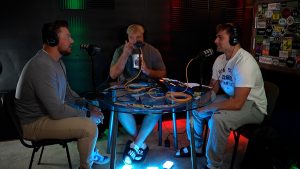A Club with a Cause
In its first year, the Cancer Community Club seeks to lend a voice of support and advocacy.
Senior Pratik Yarlagadda started a new club at NASH to bring together students that are interested in the field of oncology.
December 14, 2021
After a cancer diagnosis hit close to home, NASH senior Pratik Yarlagadda set out to start an organization that advocates for cancer screenings and treatment in underrepresented communities.
Cancer Community Club works with the Food and Drug Administration Oncology Center of Excellence (FDA OCE) to not only bring together people affected by cancer but also educate students about the field of oncology.
“Over the course of the last eight months, I have watched my dad fight cancer, which was incredibly hard for me and my family. Thankfully, he has been diagnosed as cancer-free. Because of this, throughout the summer, I took up an internship at the FDA Oncology Center of Excellence; we researched cancer drugs and treatments, and we presented them to the Board of Oncology at the FDA,” said Yarlagadda.
In 2018, an estimated 26,028 people passed away from cancer each day. Although cancer can affect everyone, discrimination and poverty put many communities at a disadvantage. Obstacles faced by these communities cause its members to suffer from health inequity, which denotes the lack of access to a fair opportunity to prevent, find, treat, and survive cancer.
In order to combat health inequity, Cancer Community Club will participate in Project Community, a health initiative that aims to introduce oncologists and blood disease specialists to people in underrepresented communities.
“Through the internship, I was exposed to an interesting opportunity,” said Yarlagadda. “This project is known as Project Community. I set up a meeting with the progenitor of this project, Mrs. Rea Blakey, and I had a discussion with her about possibly starting a club here at NASH to participate in Project Community. She thought it was a wonderful idea.”
Additionally, Cancer Community Club hopes to educate communities throughout Pittsburgh about the importance of cancer screenings and trials.
Cancer screenings are used to detect cancer when it is most treatable. Many common cancers, such as breast, cervical, and colorectal, are easily detected by cancer screenings. Moreover, screenings have helped lower the rate of cervical cancer in America by more than 50% in the last 30 years.
Clinical trials are also an essential tool for the fight against cancer. They are especially beneficial to patients that are struggling financially because the patient pays less for clinical drugs, and they receive additional monitoring and access to new technology at no extra cost.
Here in Pittsburgh, new technology and new discoveries are made every day to treat cancer. For example, the UPMC Hillman Cancer Center has published more than 5,000 research articles within the last five years. The Hillman Cancer Center also pioneered new ways to combine smart technology with treatments so that patients can electronically track their health records.
However, not all communities in Pittsburgh have equal access to these treatments and technology. The communities of Wilkinsburg, Northside, Garfield, Homewood, Mon Valley, and the Hill District suffer from health inequity.
It is essential for students in the Pittsburgh area interested in studying oncology to understand the effects and impact of health inequities. Cancer Community Club provides the opportunity for these students to educate themselves about ways to combat health inequity in their area.
Additionally, students in the club who are interested in the study of oncology will be able to attend lectures given by members of the FDA aimed to educate members about the statistics of cancer and problems cancer patients face today.
For example, many cancer treatments, such as chemotherapy, radiation, stem cell transplant, and immunotherapy, harm the patient’s immune system. Compared to people with healthy immune systems, vaccines are not as effective for people with weakened immune systems.
This is especially problematic today because of the COVID-19 pandemic. Even though many cancer patients cannot receive the full benefit of the vaccine, they are one of the most COVID-19 susceptible groups.
Additionally, much of the research done by the Centers for Disease Control and Prevention (CDC) does not include patients with weakened immune systems. These patients have to reach out to their health care providers in order to discuss precautions and routes of vaccination.
Cancer Community Club will educate the students of North Allegheny about the importance of fighting health inequity while educating its members about cancer treatments and technology. Members will also discuss the problems faced by cancer patients with experts from the FDA.
“The objectives of the club are to fundraise money for underrepresented communities and to encourage citizens throughout Pittsburgh to participate in cancer screenings and trials. Students at NASH will also be given the opportunity to listen to FDA lectures about oncology from both the scientific and statistical sides of cancer drugs. We will also be having discussions about how COVID-19 has affected the possibilities of certain communities participating in cancer screenings and clinical trials,” said Yarlagadda.
Any student interested in joining Cancer Community Club can fill out the Google form linked here.












